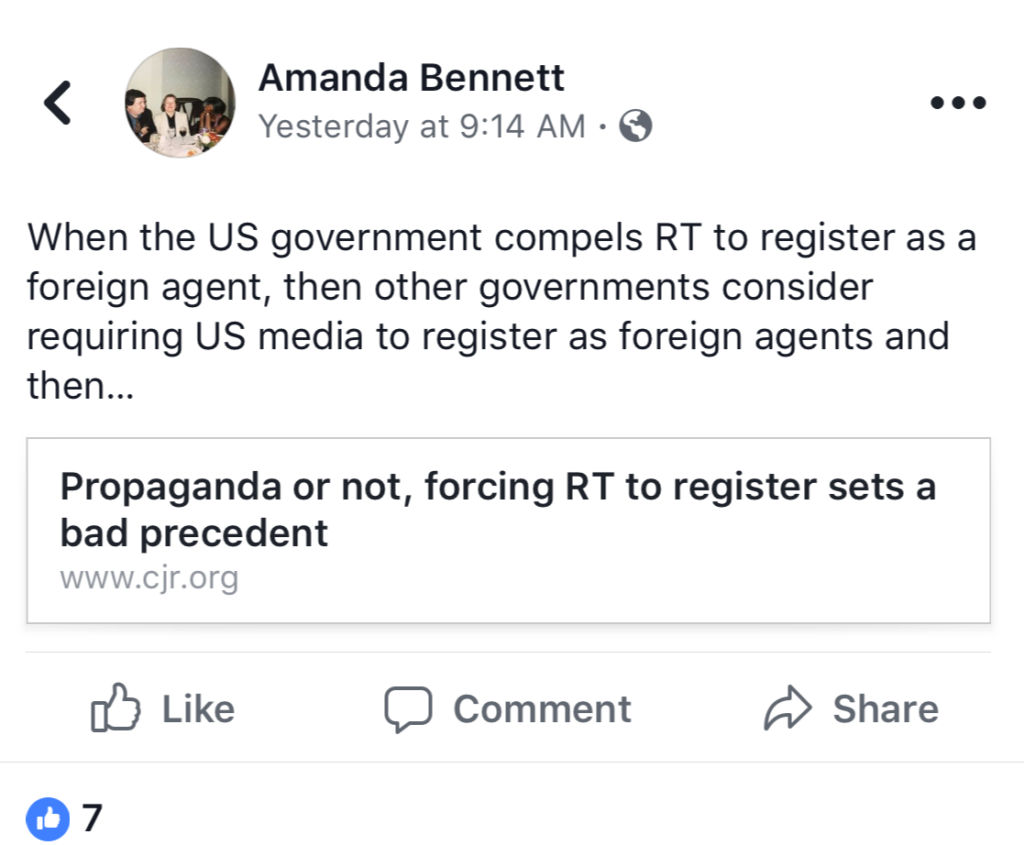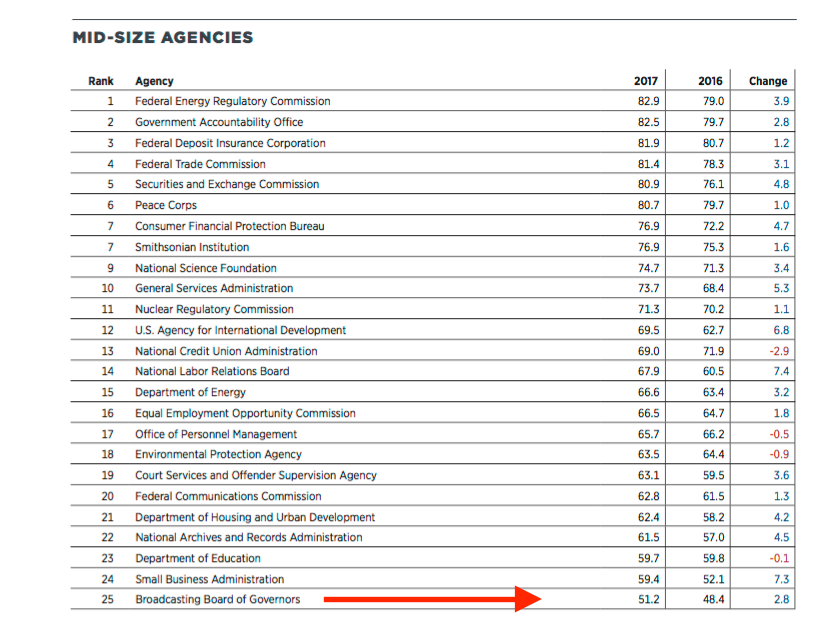OPINION
Total Meltdown Mode: BBG 2.0
Broadcasting Board of Governors Information War Lost
By The Federalist
Some recent doings in the dysfunctional world of US Government international broadcasting/media:
Town Hall Meeting:
“Watch out now, take care, beware of greedy leaders. They take you where you should not go…”
(“Beware of Darkness,” George Harrison)
Give VOA Audience What It Wants to See: Videos of Burning American and Jewish Flags Most Popular on VOA Facebook
Broadcasting Board of Governors (BBG) and Voice of America (VOA) executives were picked by partisan BBG Board members, some representing Hollywood and other U.S. commercial entertainment industries who do corporate business in Russia, China, and the Middle East. VOA Video Links: One | Two | Three. The combined Facebook views for these three VOA videos showing nothing but burning of American and Israeli flags and protesters shouting slogans against Trump, U.S., and Israel is over two million (2,281,000) as of December 13, 2017.
Award for Best Fake News Recommendation
Here's the segment with @BrianRoss (arguably the most connected broadcast reporter for some decades when it comes to learning about details of federal criminal investigations): https://t.co/pyM33Mj5hk
— Steve Herman (@W7VOA) December 1, 2017
ABC’s Brian Ross who was later suspended got a big plug for his false report from a senior Voice of America journalist.
Hoping For Business As Usual with Russia
This post on Amanda Bennett Facebook page presumably belonging to Voice of America director Amanda Bennett was subsequently removed.
Staffers of the Broadcasting Board of Governors (BBG) and Voice of America (VOA) were treated to one of the infrequent but increasingly disjointed “town hall” meeting on Friday, November 17, 2017 in the Cohen Building auditorium. The spectacle was presided over by Amanda Bennett (VOA director) and a supporting cast including her deputy Sandy Sugawara, senior official Kelu Chao and others.
Describing the affair as disjointed would be charitable given the rambling discussions of agency operations, lack of concrete facts and a growing amount of irritation among the staffers.
This is not a happy place. The scene in the auditorium appeared dark, spectral, sparsely attended. A proverbial dark chamber save for the lighting of the stage. One VOA reporter described the recent VOA town hall to several colleagues in the newsroom as resembling a 1950s TV show in which the audience submits screened questions and receives words of wisdom.
You can read into the scene what you choose. Nevertheless, from longtime observation it is clear that the chasm between Third Floor officials and the staff doing the actual work of international broadcasting has widened. It is getting to the point where one can sense a noticeable acrimony between the workforce and the so-called “leadership” of the agency even at public meetings where employees are exposed to risk of retaliation.
It was obvious that almost no one was willing to ask questions of the so-called “leadership,” until an appearance by longtime VOA English broadcaster, Jim Malone. Even with Malone, there was little in the way of probative, direct questions challenging the panel on the stage, but to his credit he went further anybody else.
The meeting atmospherics make clear that the Cohen Building is a hostile work environment. Agency officials have created this adversarial climate. Internal self-criticism and self-correction are not seen as a means to building greater effectiveness to the agency’s operations or to elevate accountability and responsibility as a standard among its managers. The risk is HIGH that going at it directly with these officials about what is wrong with the agency and their ineffectiveness in addressing management-created or exacerbated problems increases the risk of retaliation.
Fear and intimidation are integral components of the agency’s posture toward its workforce. Indeed, it is a form of psychological warfare waged against agency employees. Agency officials use the term “baby steps” to describe the approach to longstanding issues. This is code language. It demonstrates that there is no commitment to substantive changes to improve the work environment at the agency. It sends a message to the employees that there is no hope of necessary corrective action and is intended to wear employees down with a sense of hopelessness in the face of this Third Floor regime.
We recall that at one point the Partnership for Public Service (PPS) was brought in to address the agency’s horrid, consistently bad results in the Federal Employee Viewpoint Survey (FEVS). The end result: no significant impact. Indeed, this was possibly a diversionary tactic to create the appearance, not the substance, of addressing problems. Officials of the agency, especially those with long tenure, have successfully created and perpetuated the worst place to work in the Federal Government. They intend to keep it that way and attack anyone who intends to hold them accountable.
AFGE Local 1812: They Get It
AFGE Local 1812 is the largest employee union in the agency. In a recent editorial on its website, the union focused in on the 2017 Federal Employee Viewpoint Survey (FEVS). Once again the agency is at/or near the bottom among Federal agencies of comparable size.
STRAIGHT OUT OF KAFKA
This union commentary (“Straight Out of Kafka”) suggests that senior agency officials consider employee morale and related personnel issues a “yawn item.” They don’t take it seriously and don’t see the link between low morale and the agency’s overall dismal mission performance.
The agency’s officials have little if any credibility with the workforce. These officials don’t care: the employees are unimportant to their agenda.
This is the reality. It is important for employees at all levels to recognize this. The “Friends” salutation you see from the VOA director in her memos is a crock. She is not your friend. Senior agency officials are not your friends or your colleagues. The people in Labor and Employee Relations are not your friends. Considered as a whole, these people have no common interests with the employees. In effect, the agency’s horrid record in the FEVS shows that these individuals are adversaries at best. They have no respect for the employee workforce. Employees are seen as exploitable. At worst, they see the employees as a liability or annoyance.
Partnership for Public Service 2017 MID-SIZE AGENCIES: BBG is last on the list of Best Places to Work in the Federal Government.
Awards for Poor Performance
In addition, the union notes that the agency handed out internal awards to some units inside the agency with the worst scores in the FEVS survey.
We know this tactic very well: handing our awards or comparable performance evaluations is a way of shielding the managers of these units if and when there is ever a house-cleaning of this agency. It is difficult to remove managers with files loaded with what amounts to a false narrative of success or competence. That’s the game here: to embed inept people into mid-level and senior positions and keep them in these posts forever. The end result: perpetual incompetence.
We also agree with the union’s sentiments that accountability and responsibility are not a management standard. Avoidance of both is a top management priority within the “baby steps” philosophy of senior agency officials.
The IT Morass Year After Year
On another front:
Remember some time ago the boast by agency IT head Andre Mendez when he claimed to have kicked the Chinese out of the agency’s IT network?
Broadcasting Board of Governors kicked the Chinese out of its network, remains vigilant as cyber attacks continue
The accuracy of the claim is debatable, then and now. As with all cyber warfare activities, gains and losses are shifting sands.
With this in mind, consider comments in a recent Office of the Inspector General (OIG) report on the agency’s IT infrastructure:
“Without an effective information security program, BBG is vulnerable to IT-centered attacks and threats. Information security program weaknesses can affect the integrity of financial applications, which increases the risk that sensitive financial information could be accessed by unauthorized individuals or that financial transactions could be altered either accidentally orintentionally. Information security program weaknesses increase the risk that BBG will be unable to report financial data accurately. We have reported weaknesses in IT security controls each year since our audit of BBG’s FY 2013 financial statements.”
Oops.
You get the picture. The inside-the-Cohen-Building view is out of sync with reality. Financial data is only one vulnerability. The tentacles of cyber warfare extend throughout the agency within this vulnerable IT system.
Voice of America news website under an Iranian hacking attack in 2011 was showing anti-American slogans and a slur against then Secretary of State Hillary Clinton.
In the past, the Iranians successfully took control of agency websites for a protracted period of time and even posted their own screenshots.
And be mindful that when the Russians wanted to put a quick end to their conflict with the Georgian Republic they did it not solely through force of arms. They drained the Georgian treasury. War over.
With the Russians, so many possibilities.
And woe be to anyone who believes some blowhard inside the Cohen Building that the agency is somehow IT invulnerable or protected.
The only thing saving the agency at present is the Russians have likely decided it’s not necessary to do some real damage. That is not to say the capability doesn’t exist. But for now, so many other things are working well for the Russians and their ability to limit if not erase altogether any substantive impact or presence of agency programs inside Russia. And that includes the latest boondoggle, “Current Time.”
Required Reading
Among the worst of the 2017 FEVS results involve the agency’s English language program elements.
In great detail Dan Robinson, a former VOA senior White House correspondent, goes into what can be described as contributing factors to these results in a two-part series for the University of Southern California’s Center on Public Diplomacy blog.
PART I: TRUMP’S BIG FAIL (SO FAR) AT THE BBG/VOA
PART II: TRUMP’S BIG FAIL (SO FAR) AT THE BBG/VOA
While the agency has a long, negative history with regard to the FEVS, what doesn’t get as much attention is that in the last nine years, some of the agency’s worst performance comes at the hands of Obama-era appointees. Two of those appointees are still running the agency: John Lansing (agency CEO) and Amanda Bennett (VOA director) with her deputy Sandy Sugawara who used to work for the Washington Post. The same goes for the BBG Board which has all Obama era appointees. It was relegated to an advisory role in late 2016 legislation but its old members are still around.
To all appearances, the agency is low on the Trump administration’s “To Do” list of priorities.
What makes the situation somewhat comical is the frenzied hysteria from strongly left-leaning parts of U.S. media over anything remotely connected to the agency being turned into a Trump administration mouthpiece while simultaneously ignoring (perhaps intentionally) that the agency is still in the hands of Obama holdover caretakers who have allowed unprecedented partisanship to flood Voice of America program content. Exposing these blatant violations of the VOA Charter, for which Obama administration holdovers at the agency are wholly responsible, apparently would seriously undermine the hysterical message of partisan ideologues. So much for transparency and full disclosure. And if these holdover officials are mentioned at all, these are more than likely given a pass and not subjected to an in-depth treatment of how problematic their tenures have been.
We have long held the belief that the agency is not salvageable. Routinely there are new revelations of this Federal agency gone bad, gone rogue. Nothing in the VOA Charter stipulates that it can be part of a “resistance” to a president or an administration it doesn’t like, whether the administration is Democratic or Republican. But believing that “resistance” and “objective journalism” are the same thing, as many appear to believe particularly in the VOA newsroom, has gone a long way in destroying any grip on what the agency was intended to follow by the rules of the VOA Charter, which is U.S. law, and what is called for in the name of “journalistic integrity,” which requires VOA reporters to suppress rather than expose their political biases.
At this juncture, the most expedient thing to do is close the agency as it currently exists and reconstitute it, using the process known as transfer of function. We have mentioned this a number of times. And with each passing day, with new revelations of either malfeasance or incompetence it becomes more imperative.
It is doubtful that any one person has the necessary ability to affect some kind of miraculous turnaround for this agency. And even if there was such a person, the standard tactic of the rogue BBG bureaucracy is to savage him or her inside the Cohen Building with the help of hysteria-driven allies in left-leaning media. A wholesale change is called for.
Things have to be pretty bad before the wheels of government move on a problem.
They are pretty bad with the BBG. It is time to act.
The Federalist
December 2017















